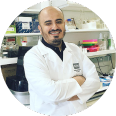Faces of FASEB
History Moves a Scientist
 Science moves history. Sometimes history moves the scientist. That’s the case with Khalid Garman, MD, PhD, a Libyan citizen who arrived in Washington, D.C., in November 2010, just before the Arab Spring ignited the following January in neighboring Tunisia.
Science moves history. Sometimes history moves the scientist. That’s the case with Khalid Garman, MD, PhD, a Libyan citizen who arrived in Washington, D.C., in November 2010, just before the Arab Spring ignited the following January in neighboring Tunisia.
Until then, he had been practicing medicine after earning his medical degree from the University of Tripoli. “I wanted to come here for a short program,” he says. “I'd never done bench research before so I was just coming for a one-year program and I came to Georgetown.”
Then, on February 15 that year, the Libyan civil war erupted. “I liked science here more than war back home,” he says.
Today, he lives in the Washington, D.C., area, where he is a visiting fellow at the National Institutes of Health (NIH). More specifically, he works in the Cutaneous Development and Carcinogenesis Section in NIH’s National Institute of Arthritis and Musculoskeletal and Skin Diseases. There, his research focuses on drug development for rare forms of skin cancer. (Yes, he holds a doctorate too, in pharmacology, earned in 2018.)
Noting the cultural diversity in the nation’s capital, he says he’s reminded that he’s not an American citizen only during election season. But in 2017, he was reminded again of his Arab ethnicity when the so-called “Muslim ban” executive order came down.
“I would say that the only way that affected me is that I couldn’t go back home,” he says, adding, “I haven’t been home for more than a decade now”—though a brother and a sister live in the U.S.
Every year or two, he must reapply—and obtain—an exchange visa, and, he says, “Every time you talk to people they say, ‘Now is not a good time to go; you might not be able to come back and finish what you're doing.’”
In the meantime, he works through diversity, equity, and inclusion challenges here. “I mean, honestly, the sciences at the higher level are not diverse—it's very white, it's very male.”
Of his mentor, a white man, Garman says, “He is very supportive and inclusive. He creates an environment where everyone feels like they belong and takes a personal interest in their career development.”
He also mentions a colleague he admires. “She is a successful Black woman who works hard, is well established in her career stage, and has continuously had successful trainees,” including post-baccalaureates and summer undergraduate trainees.
At the recent Annual Biomedical Research Conference for Minoritized Scientists conference in California, he says, “It was very important for me personally to see that there is representation, there are people who look like me, people who come from diverse backgrounds.”
That’s among the reasons he is heavily involved in the American Society for Pharmacology and Experimental Therapeutics (ASPET). He is a member of ASPET’s Young Scientists Committee and has served on the ASPET Bylaws Task Force since 2021. He joined the society’s Program Committee in 2022.
“I really love teaching,” he adds, “and I think that's one of the things that got me involved in ASPET, just the idea of conveying knowledge.”
Under the terms of his current visa, however, he will soon have to return to Libya for at least two years. There, he plans to teach.
“There's this historic old notion that knowledge becomes greater when it is shared. I believe knowledge gains value, becomes something when it is shared. If it is not shared, I don't think it's worth much. I think that's my mode of life; that's what keeps motivating a lot of my actions.”
Khalid Garman, MD, PhD, is a member of the American Society for Pharmacology and Experimental Therapeutics, a FASEB member society.